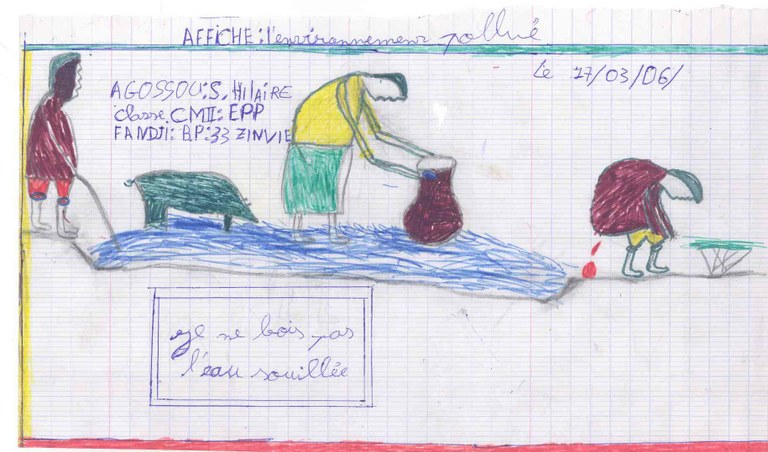Children put sanitation habits in the picture
Frescos on the walls of villages in Benin show people defecating in places they should not, while others drink water that has been polluted as a result. These are the most visible results of an awareness raising campaign on water and sanitation by the non governmental organisation AMEM.
“Do not drink this unsafe water“ message on the wall in Benin
AMEM (Aide à la Mère et à l’Enfance Malheureuse), strives for sustainable development related to access to drinking water, and adequate facilities for hygiene and sanitation, by targeting mothers and children and stimulating grass-root initiatives. AMEM works through social mobilisation: awareness raising, education, information and communication.
The water and sanitation awareness campaign started in 2002 aiming to:
- Raise awareness among children and adults about dangers and diseases related to water and sanitation
- Raise awareness about shortages and contamination of water
An important factor has been the involvement of schoolchildren in a drawing and writing competition designed to achieve behavioural change in their communities. Children were educated about the importance and need for clean water, sources of contamination and protection measures. Through group work and brainstorming they contributed ideas for improvements in two areas “Water and Shortage” and “Water and Contamination”. In 2002, pupils from seven schools in Cotonou drew pictures to illustrate problems and solutions. In 2005, pupils from Adounko village wrote letters to a friend about the non-respect of hygiene and sanitation and suggested solutions for behavioural change in their community. In 2006, these activities were expanded to schools in the Abomey-Calavi district.
The winning pictures have been published in local newspapers, spreading the messages further.

I am not drinking polluted water
Outcomes of the campaign
The children very much enjoyed being involved in the competition. They liked the participatory approach, responded intelligently and asked questions freely as if it was a game. The fact that they were outside the classroom contributed to this success. Olga Daguia, an AMEM fieldworker said: “The children still ask me when I will come again, whenever they see me passing in the street”.
Parents asked for some of the children’s drawings to be painted on the walls of their villages to remind the whole community about right and wrong practices.
The project has succeeded in raising awareness and has led to behavioural change:
- In the villages, it is now prohibited to defecate in the open. Some villagers have started constructing water-closets and others have requested subsidy for public latrines;
- women from villages like Adounko are willing and committed to provide training to women in other villages on sanitation and hygiene;
- women are committed to keep the community clean, cleaning offices, public places etc. and have organised themselves to sweep public places and the lagoon banks.
Winning hearts and minds
Before the schoolchildren could become involved in the campaign, the teachers first had to be convinced of the need to become actively involved although there was no money for extra payments. AMEM won the teachers over with round table discussions relating to water, hygiene and health in school environments.
Another difficulty was that at the beginning women in the villages were more interested in microfinance than in hygiene and sanitation. AMEM didn’t have any credits to grant, nor money to distribute. Because of the patience and endurance of the fieldworkers of AMEM, people progressively understood the relationship between hygiene, sanitation, health and development of their community. Today, the message is more readily understood.
Future of the project
Since the winning drawings were published in the local newspapers, many more schools have asked to become part of the programme. AMEM offers women in the project area literacy classes, so that they can take the lead on awareness raising and slowly take over the work done by AMEM. Sponsors are being sought to fund the construction of latrines and water supply facilities, to put into practice what is learned. In order to ensure the sustainability of the programme, AMEM will continue to lead awareness raising sessions, and will follow and evaluate the programme.
For further information, please contact Mrs. DAGUIA Casimilia Olga 03, P.O Box 0072, Cotonou, Benin


